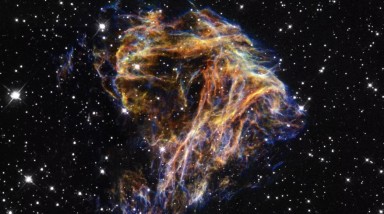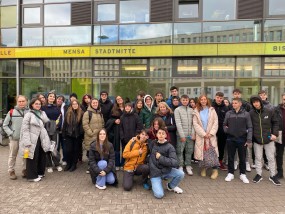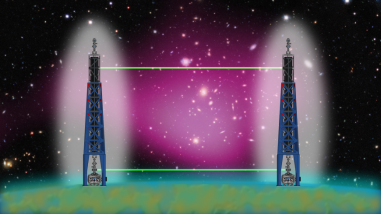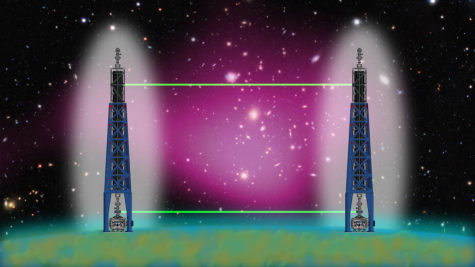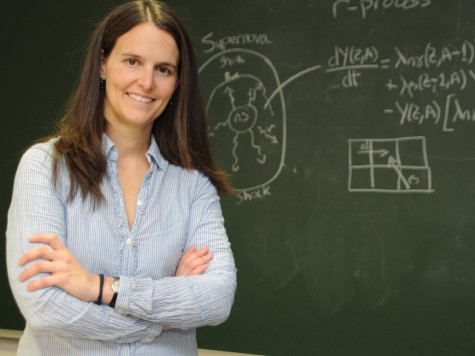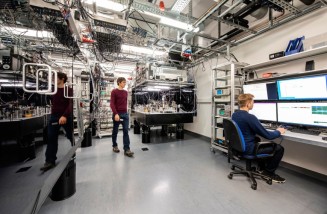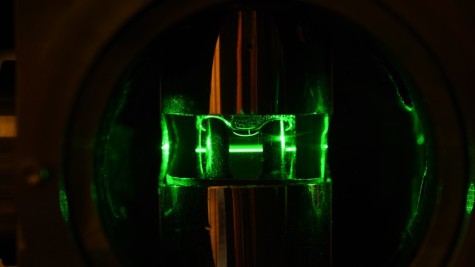-
![]() Picture: Hubble Heritage Team/Y. Chu et al/NASA
Picture: Hubble Heritage Team/Y. Chu et al/NASA![]() Picture: Hubble Heritage Team/Y. Chu et al/NASA
Picture: Hubble Heritage Team/Y. Chu et al/NASASynthesis of rare nuclei in the Universe
2024/05/13
Research team suggests new process
A new nucleosynthesis process denoted the νr-process has been suggested by scientists from GSI Helmholtzzentrum für Schwerionenforschung, Technische Universität Darmstadt, and the Max Planck Institute for Astrophysics. It operates when neutron-rich material is exposed to a high flux of neutrinos. The theoretical proposal, which was recently published in “Physical Review Letters”, may be the solution to a long-standing issue related to the production of a group of rare isotopes present in the solar system but whose origin is still poorly understood, the so-called p-nuclei.
-
![Schüler_Greece]()
![Schüler_Greece]()
Physics students from University of Nariño, Columbia
2024/04/24
DAAD Exchange programme
On Thursday, 09.11.2023, the Physics Department had a visit from a group of physics students from the University of Nariño as part of the DAAD exchange programme.
-
![]() Picture: AG Liebchen
Picture: AG Liebchen![]() Picture: AG Liebchen
Picture: AG LiebchenSmart search strategies for random targets
2024/04/24
Researchers at TU Darmstadt present new approaches to a problem of statistical physics
Whether bacteria in search of food or microrobots that automatically collect toxins or waste, again and again this is a problem in statistical physics that has not yet been clarified satisfactorily: how does an “agent” have to move in order to collect randomly distributed targets as skilfully as possible? Researchers at TU Darmstadt have now presented an approach in the renowned journal Proceedings of the National Academy of Sciences (PNAS) that can be used to systematically determine efficient search strategies. It could help to intelligently design tasks such as the search for cancer cells or environmental rehabilitations in the future.
-
![]()
![]()
Swell and shrink at the touch of a button
2024/03/13
Interaction between soft matter and ultrasound investigated
In the journal “Advanced Science”, researchers from TU Darmstadt describe how ultrasound affects soft matter. This could lead to new medical and industrial applications.
-
![]() Picture: CC BY 4.0 DEED / Bearbeitung TU Darmstadt
Picture: CC BY 4.0 DEED / Bearbeitung TU Darmstadt![]() Picture: CC BY 4.0 DEED / Bearbeitung TU Darmstadt
Picture: CC BY 4.0 DEED / Bearbeitung TU DarmstadtDetecting mysterious dark matter with atomic clouds
2024/03/07
Publications in special issue of AVS Quantum Science
-
![]() Picture: Gabriele Otto
Picture: Gabriele Otto![]() Picture: Gabriele Otto
Picture: Gabriele OttoMax Planck Fellowship for Almudena Arcones
2024/02/27
Origin of heavy elements: Nuclear matter under extreme conditions
The President of the Max Planck Society has appointed Prof Dr Almudena Arcones from the Technical University of Darmstadt as a Max Planck Fellow at the Max-Planck-Institute for Nuclear Physics (MPIK) in Heidelberg. Within the framework of the Fellowship, she will lead the theoretical research group “Theoretical nuclear astrophysics and the origin of heavy elements in the universe” starting 1 March 2024, working closely with the experimental department of Prof Klaus Blaum (MPIK).
-
![]() Picture: Klaus Mai
Picture: Klaus Mai![]() Picture: Klaus Mai
Picture: Klaus Mai1,000 atomic qubits and rising
2024/02/20
A new record for atom-based quantum computers
Making quantum systems more scalable is one of the key requirements for the further development of quantum computers because the advantages they offer become increasingly evident as the systems are scaled up. Researchers at TU Darmstadt have recently taken a decisive step towards achieving this goal. The results of their research have now been published in a prestigious publication.
-
![]() Picture: Till Böhmer
Picture: Till Böhmer![]() Picture: Till Böhmer
Picture: Till BöhmerThe internal clock of materials
2024/01/29
Publication in “Nature Physics”
Physicists in Darmstadt are investigating ageing processes in materials. For the first time, they have measured the ticking of an internal clock in glass. When evaluating the data, they discovered a surprising phenomenon.
-
![hobit 2024]()
![hobit 2024]()
Visionary research into atomic nuclei
2024/01/24
DFG extends Collaborative Research Centre 1245
The German Research Foundation (DFG) is extending two Collaborative Research Centres (SFB) at TU Darmstadt for a further funding period. One SFB is in the field of nuclear physics.
-
![]() Picture: APQ
Picture: APQ![]() Picture: APQ
Picture: APQResearch at TU Darmstadt selected as breakthrough in optics in 2023
2023/12/04
Scientists at TU Darmstadt extend research on quantum computing to new dimension
December of each year, OPTICA, the U.S. optical society, selects scientific breakthroughs of particular interest to the broad optics community that have emerged over the past year. In this year, research conducted in the group of Prof. Gerhard Birkl at the Institute of Applied Physics at Technische Universität Darmstadt has been highlighted in this exclusive list. The special issue “Optics in 2023” of the journal „Optics & Photonics News” (OPN) reports on work conducted by Malte Schlosser, Dominik Schäffner, and their colleagues, towards advancing unique architectures for quantum computing and quantum simulation.
Department of Physics
Archive
Archive

